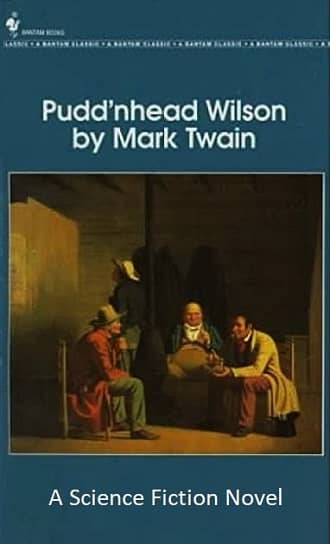An Ignored 1894 Science Fiction Novel
 Thirty years ago (COVID-19 time) on May 1, I posted an article in which I explained why a film many view as a Hollywood musical is really a science fiction film. Today, on November 30, I’ll explain why one of Mark Twain’s novels is also a science fiction novel, and for the same reason.
Thirty years ago (COVID-19 time) on May 1, I posted an article in which I explained why a film many view as a Hollywood musical is really a science fiction film. Today, on November 30, I’ll explain why one of Mark Twain’s novels is also a science fiction novel, and for the same reason.
Mark Twain, the pen name for Samuel Longhorne Clemens, was born in Florida, Missouri on November 30, 1835. Best known for the novels The Adventures of Tom Sawyer and The Adventures of Huckleberry Finn, some of his work, at both novel a short story length, dabbled in the tropes common to speculative fiction. Perhaps most famous of these is A Connecticut Yankee in King Arthur’s Court, a novel that sends the title character back in time and which formed a template for L. Sprague de Camp’s later Lest Darkness Fall. Other Twain works which are clearly part of the genre include the short stories “Mental Telegraphy,” “Shackleford’s Ghost,” and “Extract from Captain Stormfields Visit to Heaven,” all of which, along with several other stories, were collected in The Science Fiction of Mark Twain, edited by David Ketterer and published by Archon Books in 1984.
The work that I would like to take a look at through a science fictional lens, however, is Twain’s 1894 novel Pudd’nhead Wilson. Originally serialized in The Century Magazine in 1893, the novel is generally known as a courtroom drama in which the title lawyer realizes that not only is the accused innocent of the crime, but that there is a deeper secret hidden among the residents of Dawson’s Landing, Missouri. The novel is also known for the pithy chapter headings which are purportedly taken from Pudd’nhead Wilson’s calendar, such as “Training is everything. The peach was once a bitter almond, cauliflower is nothing by cabbage with a college education.” Although Wilson is the title character and heavily involved in the novel’s denouement, he disappears for a large swathe of the novel.
Set in the first half of the Nineteenth Century, Twain focuses his attention of Roxy, a woman who is only 1/32 black, but that is enough to condemn her to a life of slavery serving the Driscoll family. It also means her son, Valet de Chambre, who is the result of rape by her master, Percy Driscoll, is also a slave. Very fair skinned, many comment on the similarity of appearance between Chambers, as he is called, and his half-brother, Percy’s legitimate son, Tom Discoll. When Roxy sees some slaves sold down-river, she decides she needs to protect Chambers from that fate and, after briefly contemplating murder/suicide, she decides, instead, to swap Chambers for Tom, raising the white boy as her own and letting the world think her own son is her master.
 The Adventures of Huckleberry Finn and Zombie Jim: Mark Twain’s Classic with Crazy Zombie Goodness
The Adventures of Huckleberry Finn and Zombie Jim: Mark Twain’s Classic with Crazy Zombie Goodness